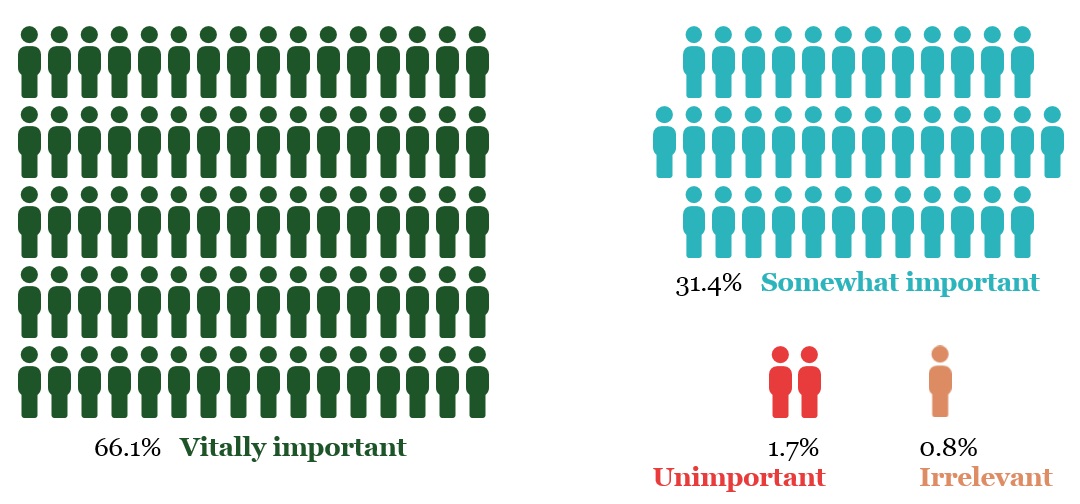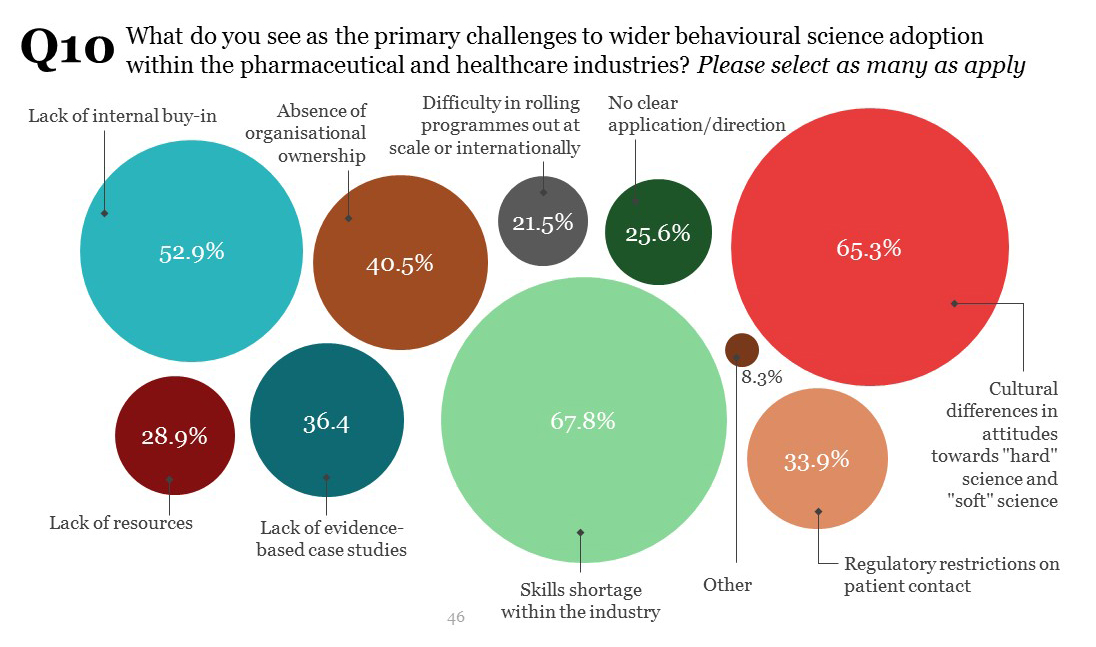New research: can pharma get healthy rewards for good behaviour?

Outside of a dedicated group of expert users and patient adherence pilot schemes, the ‘softer’ behavioural and social sciences are largely unknown or misunderstood, according to recent research with senior pharma executives and academics. For these to be more widely applied and bring benefits, the industry needs to see more evidence of success, reports Ceri James.
Tightening budgets, ageing populations and increasing rates of chronic illness means that health systems face growing economic pressure worldwide. In this environment, improving outcomes and demonstrating value is imperative. The pharma industry realises not only that it has its own role to play, but that it must move beyond traditional methods to enable behaviour change across the healthcare ecosystem. Inevitably, the breaking of old, and the forming of new, habits in every facet of healthcare is required.
To drive the cognitive shift needed to create efficient and sustainable health systems, further research and investment in behavioural and social sciences – and how best to leverage them within new or existing channels – is necessary. These disciplines, with a wide range of overlapping terminology, depending upon the source (e.g. psychology, behavioural economics or neuroscience), provide a clearer understanding of the psychological and socioeconomic influences that help shape our thought processes, while offering new ways in which to educate, motivate and inform behaviour and decision making throughout every level of the healthcare ecosystem.
The discussion around behavioural sciences and their role within healthcare has been ongoing for some time. However, pharma is an industry rooted in data and hard science, and if behavioural techniques are to be employed throughout healthcare, evidence is required to demonstrate their efficacy.
For this reason, McCann Health joined forces with pharmaphorum media to conduct extensive quantitative and qualitative research among more than 160 senior pharmaceutical industry executives and globally-renowned academics to identify the level of understanding, adoption and application of behavioural sciences in healthcare.
Early signs of adoption
Interestingly, while almost all of the survey respondents (97.5%) saw behavioural science as being vitally or somewhat important to healthcare in the future, just 12% used elements of behavioural and social sciences on a daily basis. Of these, patient support programmes, medical education and market research were highlighted as just some of the areas with proven potential for behavioural and social sciences application while, more specifically, techniques such as message framing, ethnography and System 1/System 2 decision making were also being leveraged.

Fig 1: How important do you think the adoption of behavioural science techniques will be to the success of healthcare in the coming years?
However, while some of these tools are clearly being employed within the pharmaceutical industry, the findings showed that such cases are often isolated and uncoordinated. Outside of a dedicated group of expert users and patient adherence pilot schemes, these ‘softer’ sciences are largely unknown or misunderstood.
“I don’t think the social and behavioural sciences, like psychology, are recognised with the same kind of respect as the harder sciences,” said one interviewee, a senior pharmaceutical executive. Another stated, “Many of the concepts are foreign to people who have been trained clinically.”
So what are the primary barriers to the wider adoption of behavioural sciences? Perhaps not surprisingly, almost 68% of survey respondents felt industry lacked the relevant skills, 65% said that cultural differences in attitudes towards ‘hard’ and ‘soft’ science would be a hurdle, while 52% highlighted the more general challenge of ‘lack of internal buy-in’.
Undoubtedly, this is to be expected. Pharma is, after all, an industry rooted in ‘hard’ sciences so it is understandable how in this environment the nuanced approach of behavioural economics and related disciplines could be overlooked.
It is also indicative of the fact that, while there are numerous isolated examples of pilot studies successfully implementing these practices, the true potency of these tools is still not widely acknowledged, and more must be done to spread the message and demonstrate the power of these techniques through example. Furthermore, these examples should not be limited to ‘nudging’ patients for adherence or support benefits, but recognise that the dynamic, context-specific exchange between healthcare professionals and patients is at the heart of effective communication and behaviour change.

Fig 2: What do you see as the primary challenges to wider behavioural science adoption within the pharmaceutical and healthcare industries?
A collaborative approach
Despite early challenges, there are many clear benefits to wider adoption of behavioural science at every level – from drug development and product design, to medical education, market research, reimbursement and, of course, patient adherence. And there is potential for implementation to bring with it improved efficiencies and health outcomes. This not only reduces the cost of healthcare for payers, but also provides valuable data for life sciences companies seeking to demonstrate efficacy and value.
While the potential is clear, exactly who should be the driving force behind behavioural science is less clear. Responsibility for product design and labelling would clearly lie with the pharmaceutical company, but what about the application of these techniques in continuing medical education, patient support programmes, or even demonstrating their value to providers?
“I think it’s going to be collaborative,” said one interviewee, a sentiment echoed in other discussions. “It may vary with disease state and, in some cases, we have our own branded programmes, but also many of them will be unbranded. Pharma is investing, and will continue to invest, and needs to do that in partnership with the providers, government bodies, academia and patient groups, and with well-connected agency networks perfectly positioned to help with these collaborations.”
Throughout the research one belief has been shared with little divergence: that, in an age of austerity, with a focus on value and outcomes, behaviour change will be the key for healthcare systems around the world, and behavioural and social sciences adoption will be the driving force. As one interviewee put it: “The last five years have been about digital and devices – the next 10 will be about behaviour change.”
The data gathered have been invaluable in providing a foundation for work to continue in 2017. If behavioural techniques are to provide us with innovative new tools and services throughout the healthcare ecosystem, a clear roadmap must be established. Now it’s time to begin putting our findings to work as we look to develop a common language and understanding of behavioural sciences and begin to widen the network of industry champions that will work with us in guiding healthcare through the vital next steps to enable challenges to be explored from a behavioural perspective.
As Charlie Buckwell, President of McCann Health Europe succinctly put it, “Our challenge is to ensure that all of our disciplines are able to look through a behavioural lens as part of their approach, irrespective of whether we are helping our clients with market understanding, value consultancy, HCP communications strategy or patient engagement.”
About this research
In early 2016, McCann Complete Medical set out to gather data to assess the use, adoption and impact of behavioural sciences within the Life Sciences industry. Beginning with an exploratory phase consisting of a series of interviews with senior global pharmaceutical executives and leading academics, we have been working in partnership with pharmaphorum media to establish current levels of use and measures of success. Data gathered from these interviews formed the basis of a second research phase – an industry-wide survey – that in turn was used as a springboard for the creation of expert round table discussions both in the UK and US.
With more than 160 responses from senior pharmaceutical professionals during the survey phase and valuable insights provided from the interviews and round tables, we were able to benchmark current behavioural science adoption rates, industry opinions on these disciplines as well as perceived levels of potential and the role these sciences are expected to play within healthcare in the coming years.
For more information and a summary of the research, download a complimentary copy of the report.
About the author:
Ceri James is Innovation Director at McCann Complete Medical, with over 25 years’ experience in the industry. Having spent 16 years on the client side, he has now been on the agency side for 11 years and has particular interests in customer insight, innovation and capability development. His passion for the application of behavioural science in healthcare has grown over the last 5 years.
Contact him via: ceri.james@complete-grp.com
McCann Complete Medical is a unit of both McCann Health and McCann Worldgroup and part of the Interpublic Group. McCann Complete Medical’s global medical communications network includes Complete Medical Communications (CMC), Complete HealthVizion, Caudex, and Complete Regulatory. McCann Complete Medical also has a global network of offices in association with McCann Health, located in Australia, Canada, China, India, Italy, Korea, Japan and Singapore.
McCann Health is the most awarded professional and consumer health communications network with the largest international expertise, spanning 20 countries and 60 offices. McCann Health’s global network includes McCann Echo, McCann Global Health, McCann Humancare, McCann Healthcare, JNB McCann, McCann Managed Markets, McCann Pharmacy Initiative, McCann Torre Lazur, McCann Complete Medical and Consulting at McCann Health. McCann Health is a part of McCann Worldgroup and the Interpublic Group.











